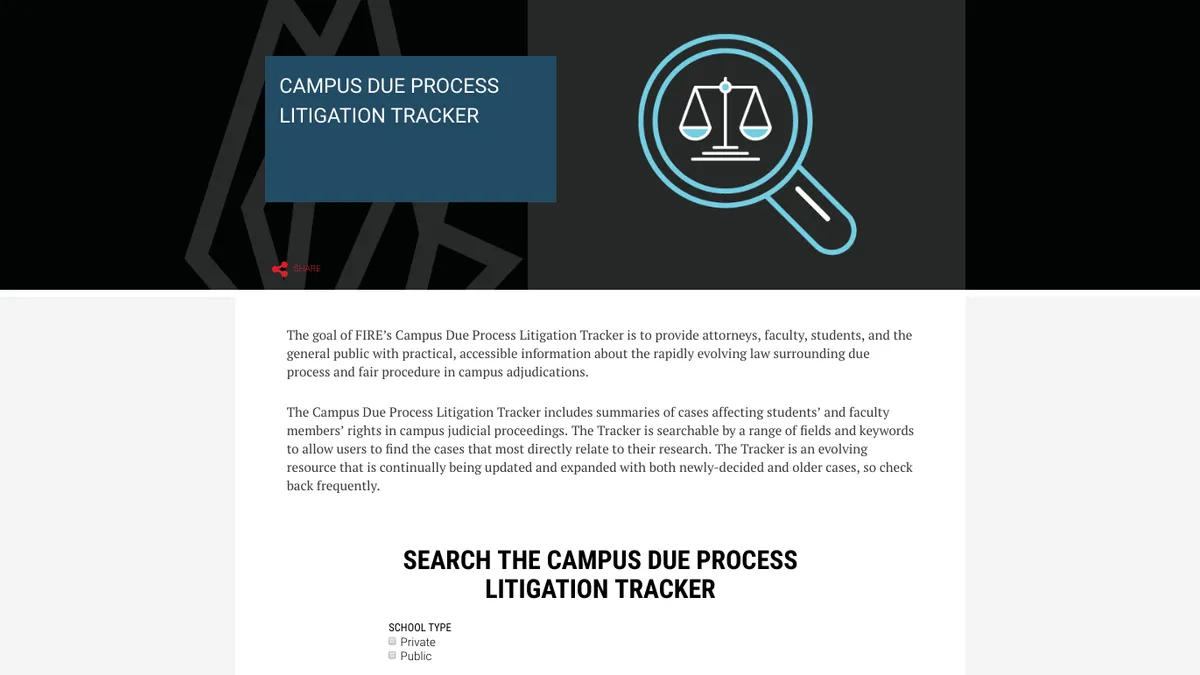Dive Brief:
- The Foundation for Individual Rights in Education (FIRE), a civil liberties watchdog in academia, has introduced a massive new database that details the lawsuits in which students and others sued over due process violations of their sexual violence cases.
- Such suits became more common after due process activists railed for years on the Obama administration's controversial rules for how colleges should investigate campus sexual assaults.
- With the case law around Title IX rapidly changing and the U.S. Department of Education imminently releasing its new regulations on the sex discrimination law, such a tool will be helpful, lawyers and other campus practitioners say.
Dive Insight:
The Obama administration published a "Dear Colleague" letter in 2011 redefining how colleges should investigate and adjudicate episodes of sexual violence.
Many civil liberties advocates were enraged. Though guidance from Obama's Education Department was heralded as providing sexual assault survivors with new protections, some due process advocates believe it led to college officials ignoring the rights of students accused of sexual violence. These activists said administrators acted out of fear that their federal funding would be yanked if they didn't follow the new rules Title IX guidance.
More than eight years later, at least 500 lawsuits have been filed challenging the fairness of institutions' handling of campus cases. Title IX became even more of a hot-button talking point. Education Secretary Betsy DeVos rescinded the Obama policies two years ago, and the draft rules put forward by the department since then give colleges more flexibility in adjudicating sexual assault cases. Institutions were sued much more frequently in the last several years, putting new pressure on administrators charged with keeping their universities Title IX-compliant.
FIRE says its new tracker will help lawyers and administrators make sense of an emerging and convoluted area of case law that often differs drastically across jurisdictions.
Observers say the tracker could be beneficial but are skeptical colleges will change their sexual misconduct practices even with readily available information.
"I am a fan of formats that allow people to learn from the cases," Brett Sokolow, president of the Association of Title IX Administrators, told Education Dive in an interview. "I'm not so sure this is that format — an aggregate glut of all that's happening. … We're hearing from administrators that are not sure what to do, and the mere existence of lawsuits doesn't teach anything."
FIRE rolled out the Campus Due Process Litigation tracker this month as a slicker, more comprehensive version of a spreadsheet that has long floated among pundits and journalists, maintained by KC Johnson, a history professor at Brooklyn College and Samantha Harris, FIRE's vice president of procedural advocacy.
The tracker allows users to search for cases by an array of criteria, including the state where the lawsuit originated, whether the institution being sued is public or private, and whether the outcome favored the plaintiff — often a current or former student, or the university.
"Over the past few years, there has quickly emerged a body of case law — which varies [by] jurisdiction — that anyone representing a student in a campus judicial proceeding must be aware of," Harris wrote in an email. "We decided we could help advance the cause of due process on campus by creating a collection of easily digestible case briefs, summarizing these important rulings, that attorneys could use to find the decisions that most directly affect their own cases."
Taylor Parker, compliance coordinator and deputy Title IX coordinator at the Ringling College of Art and Design, said the tool is helpful for centralizing the cases. But she cautioned officials: They should consult with their own legal teams first and not deviate from institutional policy when investigating a case.
"If an investigator is in the middle of an investigation, and they read that in this jurisdiction this needs to happen, you have an obligation to what's in your policies,” Parker said.
The primary audience for the tracker is lawyers, but it could help others — including administrators, journalists, students and professors — who are interested in how institutions have treated accused students, Harris wrote. The cases are monitored through PACER, known formally as Public Access to Court Electronic Records, an online service that contains information about lawsuits filed in federal courts. Complaints in state courts are much harder to follow because no single database documenting them exists.
Often officials do not take the time to discuss what they could learn from legal cases, even when they lose them, Sokolow said. Administrators prefer to handle problems only when they arise, he added.
And sometimes when building a legal defense, universities constructive a narrative that would be more favorable to them in court but don't go on to follow or improve upon their sexual misconduct policies, Sokolow said.
"We're believing our own bull----," he said.














